Last Updated on June 5, 2023 by Georgie Smith
Seeing your pooch forcefully scratch and gnaw at its skin is a terrible feeling as a pet parent. It gets even worse when those itchy areas become inflamed, and your dog starts losing hair. Once hair loss exposes the skin, it can quickly get wounds from excessive abrasive scratching.
These open wounds leave the dog vulnerable to bacterial infection and further distress.
To alleviate their suffering, you might want to check out the best dog shampoos for skin allergies/shedding. Natural ingredients in these shampoos give you the best chance of relieving itchy, painful, and sensitive skin caused by bacteria and allergies.
Basic Comparison:
SSL
Storage
Domains
Sub-domains
Oatmeal Pet Wash 17oz
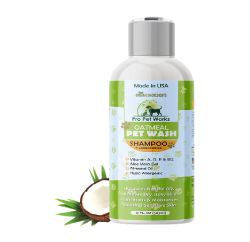
Pro Pet Works
Gel
Sensitive skin, Allergies
Easy to use
Nootie Oatmeal
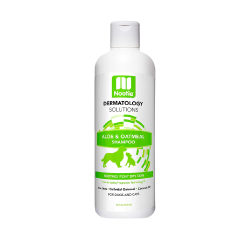
Brand - Nootie
Scent - Scent
Deodorizing,Soothing
Gel
Paws & Pals
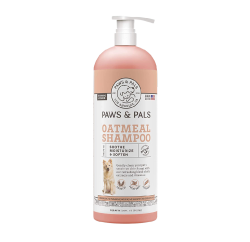
Brand - Paws & Pals
Scent - Oatmeal
Item Form - Liquid
Nourishing,Itchy
As pet owners, you’ll naturally find yourselves in the position to ask what is causing these reactions and how can you stop them. Most of the time, these are reactions to allergens or bacterial infections.
Skin Allergy Causes
Just like people, dogs can show allergic reactions if they have an overactive immune system. When a dog inhales, ingests, or touches a foreign environmental substance, his immune system may read it as a threat. As the dog tries to clear itself of these substances, a variety of skin symptoms may appear.
A few common allergens include:
- Fleas
- Mold Spores
- Pollens
- Dust Mites
- Cigarette smoke
- Dander
- Feathers
- Food ingredients
- Prescription drugs
- Perfumes
- Cleaning products
- Fabrics
- Insecticidal shampoo
- Rubber
For allergies caused by food, it may take some detective work to find out which food substance is causing the allergic reaction. A method-of-elimination diet will most probably determine the allergen. Dogs with a food allergy will commonly have itchy skin, excess shedding, diarrhea, and vomiting. If you find out your dog is specifically allergic to any particular food, you should stop feeding him any of it immediately.
Types and Symptoms of Skin Allergies in Dogs
There are many different types of skin allergies in dogs. It can be tricky to decipher which is which because the symptoms of all these skin conditions can be the same. If you suspect a skin allergy, visit your vet for a diagnosis before treating it yourself. [1]
Dog Skin Allergies Caused by Natural Environment
Atopic Dermatitis
Natural sensitivities to mold spores, pollen, dust mites and other environment-related factors can cause an allergic skin condition known as atopic dermatitis.
Extremely itchy skin is the first tell-tale sign of atopic dermatitis. Other red flags include red bumps, darkened and thickened skin, stained fur from excessive licking, hair loss, foul odor from the dog, and frequent head shaking. Depending on the trigger, symptoms can also manifest as hay fever: sneezing, and watery eyes.
Topical ointments can help soothe rashes and itch, but the best action is to identify allergens and avoid contact.
Dog Skin Allergies Caused by Parasites
Flea-allergic dermatitis
Flea bite hypersensitivity is among the most common skin disease in pets. It is a result of an allergy to flea saliva. Flea allergic dermatitis usually causes pruritis or severe itching of the skin which leads to scabbing and hair loss. Many times, pruritis affects the dog’s rear end more than the head or front of the body.
Note that flea bite dermatitis and flea allergy dermatitis are not the same. Fleas themselves cause itching directly after their bite. In FAD, sensitivity to flea saliva produces several immune system responses which magnify the severity of itching. Treatment for FAD includes tick and flea shampoos, spot-on applications, and sprays.
Mange (Mites)
Mange is another common skin disorder caused by tiny parasites called mites. There are two main types of mange: sarcoptic and demodectic. Their difference is that different parasites cause them
Sarcoptic mange, commonly known as canine scabies, is easily contagious among dogs and humans, but the parasites don’t persist in humans. Canine scabies causes intense itching, red skin, sores, and balding. A dog with demodectic mange, on the other hand, does not itch extremely but can get sores, scabbing, and bald spots from the mites. This type of mange is not contagious between animals or people.
Topical medication treats localized demodectic mange. Canine scabies requires more aggressive treatment using oral medication and specialized shampoos.
Dermatophytosis (Ringworm)
Despite its name, fungi cause ringworm and not worms. The term “ring” describes the circular patches that form around inflamed, scaly, and bald spots on the dog’s skin.
Puppies are the most susceptible, and the infection can spread quickly between dogs and pet owners at home. You will need to quarantine your dog for a few weeks and deep clean your house to kill any dormant fungal spores. Also, visit the vet to seek anti-fungal treatments.
Dog Skin Allergies Caused by Chemicals
Irritant Contact Dermatitis
Irritant contact dermatitis occurs the first time your pet touches an extremely irritating substance. Common culprits are detergents, petroleum by-products, and cleaning acids. Some hypersensitive dogs can also get allergies from harsh flea powders and shampoos, topical antibiotics, carpet deodorizers, and insecticides.
Contact dermatitis has no cure, but it is easy to solve by preventing exposure.
Drug Allergies
Intravenous, oral and topical medications can prompt allergic reactions in dogs. The most common drugs that cause adverse skin reactions include sulphonamides, penicillin vaccines, and antimicrobials. Dogs may experience acute itching that results in self-harm.
Diagnosis can be hard for drug causes since symptoms usually start three weeks after administration of the drug. In mild cases, merely stopping medication can end the effects.
Secondary Infections from Allergic Reactions
Bacterial Infection
Bacterial infections manifest as bright red sores that spread quickly throughout the dog’s skin. Infections are frequently a secondary disorder caused by constant scratching. The more the dog scratches during an allergy, the more chance there is of him ripping the skin, which can lead to a dog skin infection.
Yeast/Fungal Infection
The skin is host to numerous fungi. Under typical day-to-day circumstances, these organisms do not cause problems, but under severe skin conditions, they can become opportunistic and cause infection. If the number of yeast organisms increases, a yeast skin infection occurs. This infection results in scabby skin, hyperpigmentation, musty odor, itching, and flaking skin.
All skin conditions pose the risk of secondary infections that require medical treatment. As your dog scratches, licks, and bites its skin, it opens itself up to potential bacterial and yeast infections. See a professional if your dog is scratching or licking unreasonably, or if you notice any changes in their skin, like redness, scaling, or excessive shedding.
Reason Why Dogs Shed
Shedding is normal for dogs to replace old and damaged hair. The amount and frequency of hair dogs usually shed are dependent on their breed and seasonal changes. Many dogs develop thick coats in the winter that shed in the spring.
You cannot stop a healthy dog from regular shedding, but you can reduce the number of stray hairs in your home by brushing your dog regularly.
What Makes Dogs Shed Excessively?
Excessive shedding can be healthy for some breeds, but sometimes it can be the result of a medical problem, stress, or poor nutrition for others. Consult your vet to determine if your dog’s excess hair loss is natural or a symptom of an underlying illness or allergy.
Excessive shedding may be due to:
- Food allergies
- Inhalant allergies
- Parasites
- Fungal or bacterial infections
- Kidney, liver, or thyroid disease
- Pregnancy or lactation
- Certain medications
- Skin trauma due to licking
- Immune disease
- Sunburn
- Contact with irritating or caustic substances
- Cancer
Vitamin E, oat protein, and omega six fatty acids are vital ingredients to look out for in food and specialized anti-shedding shampoos to prevent shedding. Specially formulated dog shampoos have the correct pH to maintain the delicate balance of essential oils and moisture on the skin.
A good shampoo also contains tea tree oil or aloe vera which can gently cleanse out dirt while soothing irritated skin.
There are a huge variety of pet shampoos on the market, and it can be challenging to choose the best one. We’ve reviewed a selection of highly recommended products from different pet owners to help you choose the best dog shampoo for skin allergies and shedding.
The Leading 5 Dog Shampoos for Skin Allergies/Shedding:
Natural Oatmeal Dog Shampoo by Pro-Pet Works
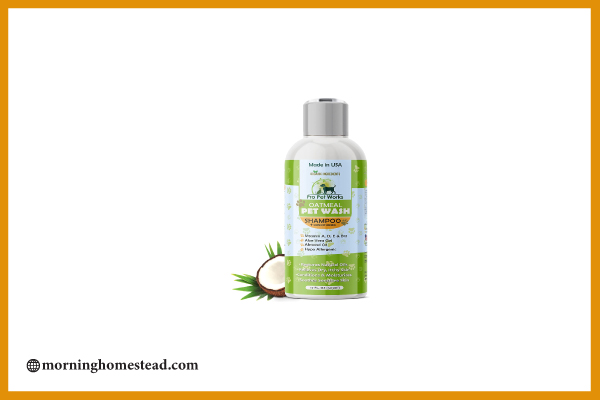
Hypoallergenic Shampoo with Conditioner for Dogs and Cats
Pros
This organic blend shampoo is one of the top choices in the pet grooming market today. Specially formulated for pets with sensitive skin, the Pro Pet Works Natural Oatmeal Dog Shampoo and Conditioner is free of fragrance, soap, and harsh chemicals.
It is rich in aloe vera, almond oil, and Vitamins A, D, and E to moisturize dry and itchy skin. The formula is powerful enough to get rid of most dirt, parasites, bacteria, and dry skin issues, but at the same time safe to use on dogs of all breeds and always.
This product is hypoallergenic. It is excellent for dogs with grass, food, and flea bite allergies as thoroughly dry itchy skin. Also, it comes in a 17-ounce biodegradable bottle.
Paws & Pals Natural Dog Shampoo and Conditioner
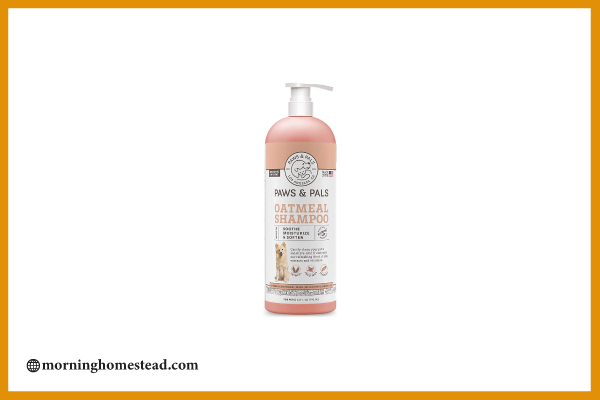
Vet Formula Wash for All Puppy & Cats
Pros
Paws & Pals focuses on improving the health of canine coats and skin. It’s from all-natural, vegan ingredients, so it’s great for dogs who don’t react well to harsh cleansers. It contains essential oils like rosemary and chamomile, as well as Vitamin E and oatmeal to reduce skin inflammation and replenish natural skin oils.
Paws & Pals Natural Dog Shampoo and Conditioner cure itchy, irritated, dry flaky skin and gives your dog’s coat a silky, non-oily healthy glow. Reviewers especially like its light and not overpowering cherry-and-coconut smell.
Anti-Itch Oatmeal Spray by Bodhi Dog
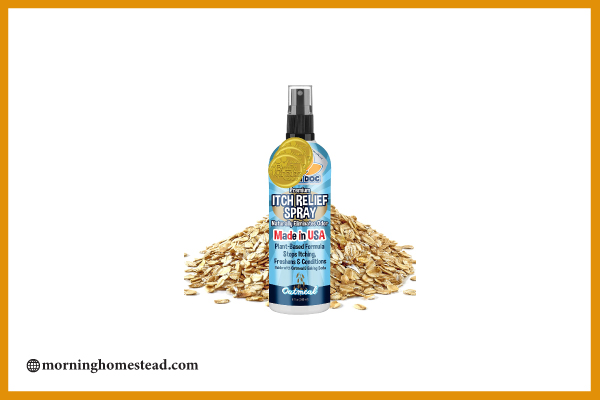
All-Natural Hypoallergenic Soothing Relief for Dogs and Cats
Pros
Bodhi Dog Anti-Itch Spray is topical oatmeal and baking soda treatment intended to provide relief from itch, as well as freshen and deodorize your dog’s coat.
Use it for relieving hot spots, flea bites, itching from grass allergies, pollen allergies, food allergies, scratches, and irritated skin. It is safe for dogs, puppies, cats, kittens, rabbits, ferrets, guinea pigs, and horses with sensitive skin.
This product is full of plant ingredients including oat proteins, deionized water, colloidal oatmeal, wheat germ, plant extracts, baking soda, glycerides, and Vitamins A, D & E. The baking soda in the spray offers antiseptic, antifungal, antibacterial, and anti-inflammatory properties.
A few spritzes leave the skin soft and smelling gentle with a light apple scent. Bodhi Dog Anti-Itch Oatmeal Spray for Dogs and Cats comes in an 8 oz. and a 17-oz. Bottle and can also work as a detangling spray.
Nootie Oatmeal Dog Shampoo with Soothing Aloe
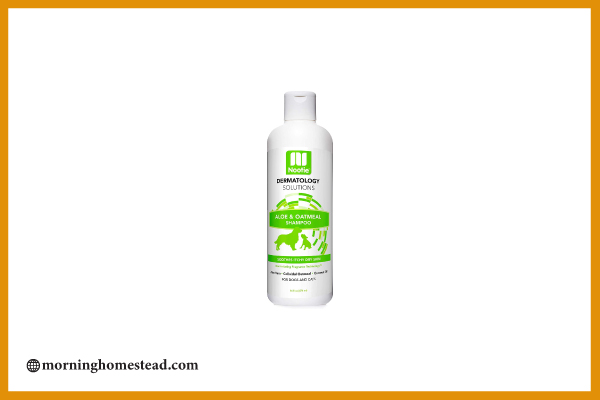
All-Natural Deodorizing Formula for Itchy Skin Relief
Pros
Nootie Oatmeal Dog Shampoo contains Pordenone, coconut oil, and colloidal oatmeal in its formula. The ingredients work together to relieve itch and refresh dry skin. It contains no parabens, soap, detergents, or other harmful chemicals that affect the natural pH level of a dog’s exterior.
With only a few drops you can lather it richly onto your pet’s coat and massage it. It is simple to rinse off and is safe and hypoallergenic. It also contains aloe vera gel to help heal irritated skin. It is available in 16-ounce and 1-gallon variants.
Hypoallergenic Dog and Cat Shampoo by Particular Paws
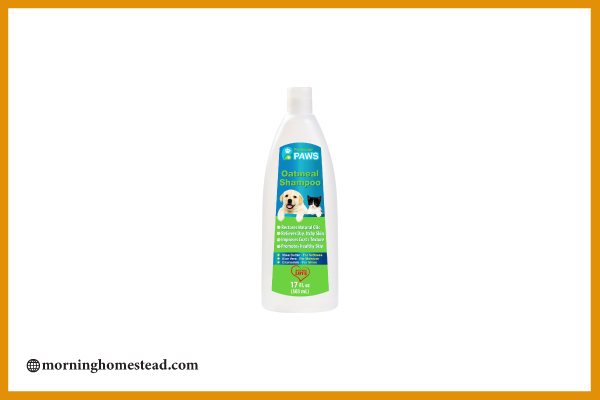
Hypoallergenic Shampoo with Aloe Vera, Chamomile & Rosemary for Sensitive and Young Skin
Pros
The shampoo is perfect for puppies and cats, leaving them smelling fresh, and feeling soft, and all without the added itching. It is all-natural and gentle enough for sensitive young skin. There are no extra chemicals to irritate skin while removing dirt, grime, dander, and more.
Each 12-ounce bottle contains aloe vera for soothing and moisturizing skin, rosemary honey for a natural aroma, and chamomile extract to improve skin texture. The Particular Paws Hypoallergenic Dog and Cat Shampoo heal and prevents dandruff and itchiness, leaving your pup feeling soft and clean after every wash.
Treatments Available
Allergy Medications
Allergens will always exist in a natural environment so your vet may recommend medications to control your dog’s allergic reactions.
- Allergy injections may help your dog in the case of airborne allergens. These help your pet build resistance instead of masking itchiness.
- Antihistamines like Benadryl and Atarax may work for certain breeds of dogs. Consult your vet first.
- Cortisone can suppress inflammation if the reaction is severe. However, these drugs are strong so only use them under the recommendation of your veterinarian.
Natural Relief for Allergies
Here are some topical fixes for itchy skin using ingredients you probably already have at home.
- Green Tea: Polyphenols in green tea have antihistamine and anti-inflammatory properties that calm inflamed, itchy skin. Make a concentrated brew, let it cool, and then apply it to the itchy areas.
- Aloe Leaf: An aloe plant at home is useful for all sorts of skin ailments, ranging from your sunburns to your dog’s itchy skin. The fresh gel contains enzymes not found in a bottled gel that help heal skin and decrease inflammation. Slice the leaf to extract the gel. Apply the gel inside to itchy areas.
- Baking Soda: A paste made from baking soda and water can work wonders in helping calm itchy or reddened skin. You can also dilute the mixture in a spray bottle and spray your dog’s exterior as necessary.
- Witch Hazel: Soak a cotton ball in organic witch hazel and apply it to rashes a few times a day. You can even put some in a bowl and dip your dog’s feet in it if he has itchy paws. Witch hazel is high in tannins (a class of astringent) and can help reduce swelling and repair broken skin.
Treatments to Aid in Skin Recovery
To help your dog recover from dandruff and patchy skin, consider trying some of the following remedies:
- Omega 3 Fatty Acid Supplements: A common nutritional issue for dogs is an omega-three deficiency. Adding a bit of fish oil to your dog’s meals may eliminate dry skin and dandruff. You can purchase fish oil from any drug store and some pet stores.
- Vitamin E: You can either break Vitamin E capsules and mix it into your dog’s food or rub the contents directly on the skin to moisturize it.
- Apple Cider Vinegar: ACV helps to control dandruff and soothe itching. Just mix 1-part ACV and 1-part water in a spray bottle. Spray on the skin and just let it dry. If your dog has open rashes and wounds, you might want to try something else because this will sting.
- Coconut Oil: rub the oil directly on your dog’s skin once or twice a day or add a tablespoon of the oil in their meals. Coconut oil is beneficial in moisturizing dry skin.
- Oatmeal Bath: Choose oatmeal dog shampoos to help to balance skin oils and eliminate dandruff.
Wash your dog’s bedding frequently and brush their coat daily to stimulate the skin’s natural oils and remove dandruff.
Frequently Asked Questions:
Q: How does an allergen create allergies?
A: When your pet is open to a potential allergen, such as grass pollen, his immune system develops antibodies to the foreign substance. The very next time your pet encounters this allergen, the immune system has a more exaggerated response to the allergen.
They send out signals to the brain to release histamine. Histamines have many functions in the body, among them the opening of capillaries and contraction of muscles. They both contribute to intense itching.
Q: What Should I Do If I Think My Dog Has Allergies?
A: Visit your veterinarian for diagnosis. After conducting a physical examination and history check, the vet may be able to determine the source of your pet’s allergic reaction and prescribe treatments.
Q: Can we use human shampoo on dogs?
A: The short answer is NO. Human shampoos only suit the acid mantle of the human skin. If you use this on a dog, it will break down its acid mantle and upset the pH balance of its skin. It may cause even more irritation, shedding, irritation, and lesions.
Q: How often should I bathe my dog?
A: A dog living indoors should bathe once or twice a month. If prescribed by a veterinarian, you can wash a dog more frequently. In case your dog goes outdoors and gets dirty often, you can bathe him but choose a mild shampoo.
Q: My dog hates baths. Help!
A: Practice having him in his bathing spot, with no water running at first. Give him his meals there so he will associate bath time with a more pleasant activity like eating. Keep practicing this in short sessions. Introduce water by gently pouring lukewarm water over your dog’s feet.
Gradually increase the amount and coverage every session until you can give him a full bath. Always reward a dog with treats after a shower. This act will make him believe he did a good thing and will want to get another bath when the time is right.
Conclusion
Overall, keep in mind that dogs have sensitive skin. Depending on their breed and what type of condition they suffer from, some shampoos and conditioners may work better than others. When selecting the best dog shampoo for skin allergies/shedding, check with your veterinarian which ingredients and treatments you should look out for based on your dog’s condition.
Whether your dog has dry, oily skin, irritated, or flaky skin, there exists a dog shampoo that is right for you!
We hope you enjoyed and learned a lot from this write-up. Know any dog lovers and owners? Please share this article with them. Together, let us be wary of our pets and their needs!
Why Choose Us?
Our experts are always digging to discover intellectual resources that would improve your life and buying decisions. We at Morning Homestead thrives to keep servicing you with insightful articles about trending and useful products for you. From tools to animal care, gardens, diet and so on, you will get what you want.
We love hearing from our readers, therefore, leave us a message in our comment section, and one of us will respond promptly. We want to thank you one more time for your valuable time.

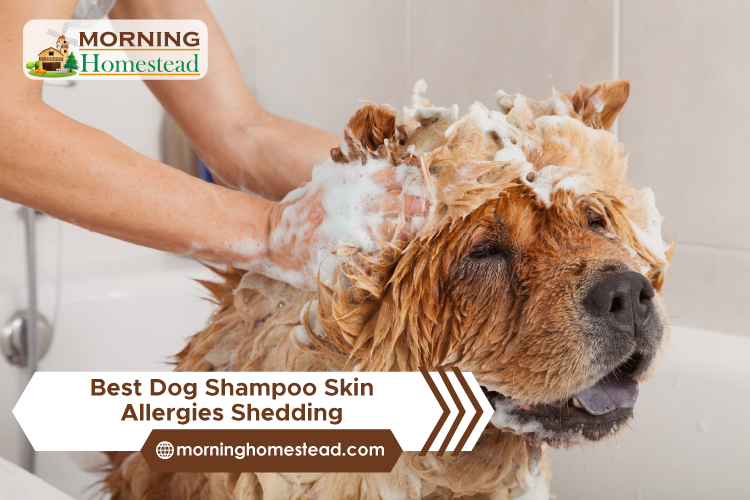
![Best Guinea Pig Shampoo: Safe Shampoo For Guinea Pigs [2023] Guinea-Pig-Shampoo](https://morninghomestead.com/wp-content/uploads/2020/06/Guinea-Pig-Shampoo-150x150.jpg)
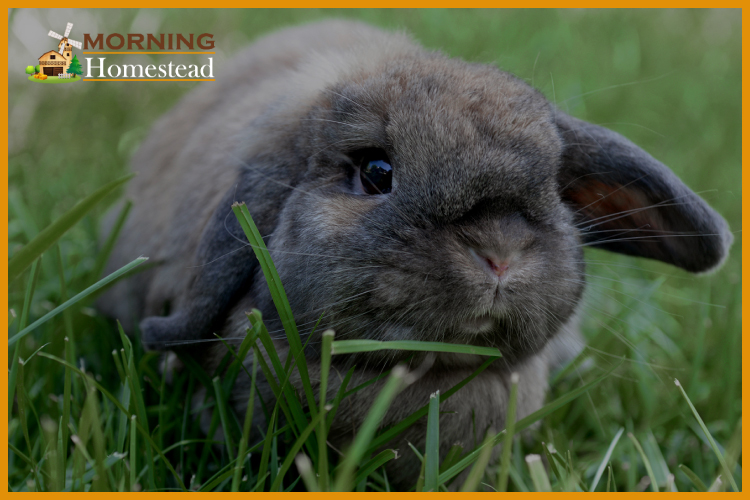

![Best Strategies And Comfort Products For Dogs With Anxiety [2023] Best-Strategies-Comfort-Products-Dogs-Anxiety](https://morninghomestead.com/wp-content/uploads/2019/06/Best-Strategies-Comfort-Products-Dogs-Anxiety-150x150.jpg)